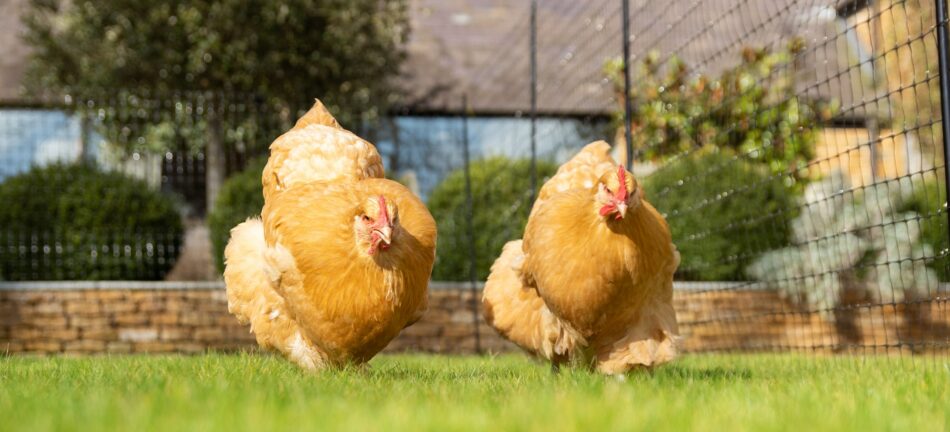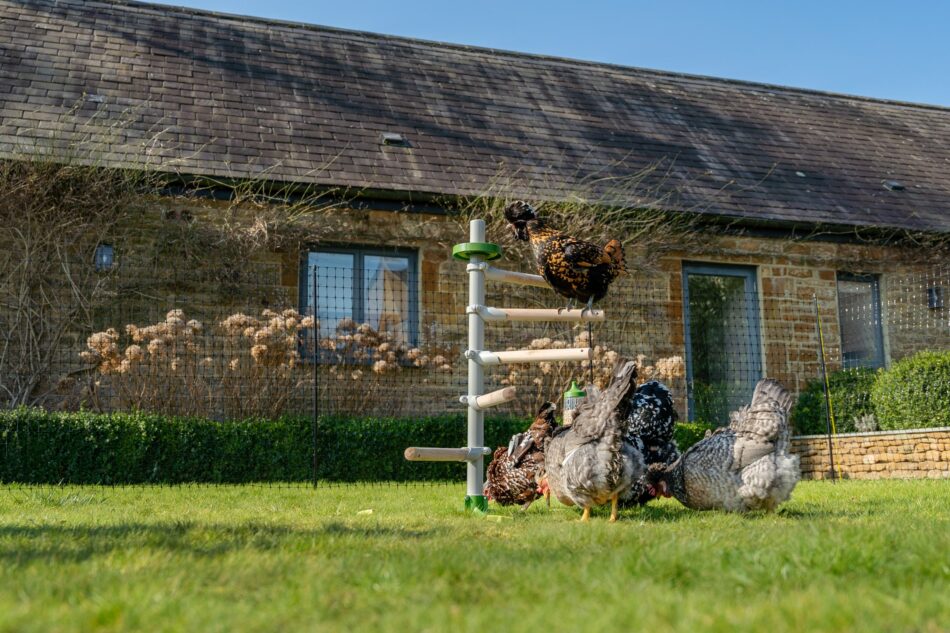How to chicken-proof your yard
It’s a lovely summer day – the sun is out, the colorful flowers in your backyard are in full bloom. The bees are buzzing, the vegetables are thriving, and raspberries are just waiting for you to pick and eat them straight from the bush. A nice, refreshing breeze blows lightly through the rustling leaves – and carries a different kind of sound with it.
Cluck, cluck.
Years ago almost everyone knew this noise from their own backyard.
Cluck.
Nowadays, a lot of people have only heard it in movies or maybe at the petting zoo.
Cluck, cluck.
This time though, the clucking is the most relaxing noise you could imagine, turning this beautiful day into perfection. Your little flock of backyard chickens, happily clucking away in your beautiful yard, supplying you with fresh, tasty eggs every day.
Does this picturesque scene sound somewhat too good to be true? A beautiful backyard with flowers, vegetables and berries that are not completely pecked and ruined by the chickens living with them? Is that even possible?
Yes, it is! And we will tell you how to chicken-proof your yard so that you can make your dream of keeping chickens and still having a beautiful yard a reality.
A secure chicken run
The easiest way to keep your yard in a pristine condition is to keep your chickens in an enclosed area. With a spacious chicken run, you’re able to keep the chickens in that space so that they won’t dig up your precious vegetables.
This might not be an option for everyone due to the garden’s shape, size or sloped areas. If this is the case, consider a mobile chicken coop. These coops allow you to move your entire flock quickly and easily in order to give them access to different areas of your yard or garden.
Yard size
The most important thing to consider is how much room you have in your garden that you would like to offer to the chickens. That determines how many chickens you can keep – without overgrazing your yard.
The more space you can offer your hens, the less damage they will cause. Their scratching will not be limited to a small area, but instead, they will be able to forage across your yard. Chickens will happily weed-eat for you, as well as rid your lawn of pests like slugs, snails and caterpillars. With enough space, your flock won’t destroy the lawn but will actually help keep it healthy.
Chicken breeds
Another important factor to consider is the breeds of chickens you choose.
Hybrid breeds usually cause the most damage, as they are constantly looking for food as an energy supply due to the demand of producing an egg almost every day. Hybrids are generally hardy birds that are easy for first-time chicken keepers. However, a better choice for a beautiful backyard are purebred chickens.
Depending on what you look for in a chicken, and if the eggs are not the most important part of your chicken parenting journey, bantam (miniature) or ornamental breeds are generally easy birds to keep in the garden. Their small size and lower energy requirements often prevent them from doing too much damage. Some popular breeds to keep in a garden are:
These chickens make beautiful, friendly pets and are known to be gentle with your garden. Their eggs are generally very small, and laying is infrequent (2-3 eggs per week).
Securing flower beds and veggie plots
An easy way to keep plants safe is a homemade hoop house covered in plastic or netting to keep your hens from sneaking a taste.
If that’s not an option, you could install raised beds in your yard. Most chickens aren’t interested in foraging for food above their head level, so they tend to leave plants in raised planters alone. And, raised garden beds make for easy, back-friendly, and more enjoyable gardening.
If you don’t have raised beds or want hoops around your plants, we’d recommend a mobile fencing option to allow your chickens to roam freely, yet not show off their landscaping skills on your veggie plot. Mobile Chicken Fencing from Omlet is ideal to keep chickens out of certain areas. Our fencing blends into your garden and is available in 39, 69, 105 & 138 ft rolls. This movable chicken fencing is much easier to install than chicken wire and features many benefits such as tangle-proof netting, adjustable poles and reflective badges to help you find the gate at night.
Omlet’s flexible chicken fencing comes with an inbuilt gate which features a strong catch that is comfortable to use. You can also set the width of the gate opening to your preferred size, making it easy to get in and out to feed your chickens. The gate can be positioned wherever you want within the layout you have chosen. You can put it at either end, the middle, or anywhere else.
Taller than most chicken fencing, Omlet’s chicken fence has an overall height of 4 ft. With that height, you can be confident that even the most determined of your feathered friends will be prevented from making a great escape. The poles of the fence are adjustable to ensure that the netting remains tight and secure at all times.
Offer a “chicken spa” area
Chickens love to dig up dry soil under bushes to enjoy a dust bath in the sheltered, shady area. Allow them to find their favorite spot, or plant some chicken-friendly bushes in an area you are happy to devote to your chickens, and they will most likely not think about any other plants. A chicken spa like that will not only keep your hens’ feathers in beautiful condition, but will also keep them in good spirits and health.
Keep an eye on your chickens
The best and safest time for your chickens to free range is usually when you are with them and can keep an eye on them. This allows you to keep them from causing too much mischief, and from getting into plants they shouldn’t. Throwing a handful of tasty corn in an area as far away as possible from flowers and veggies will quickly distract your flock from your flora.
There may be plants you want to keep your flock away from to keep them producing and looking their best, but there are some plants that are downright dangerous to chickens. Plants that are toxic to chickens include:
- Daffodils
- Azaleas
- Rhododendron
- Raw beans
- Ferns
- Rhubarb
- Raw potatoes or onions
- Tulips
This is not an exhaustive list, so be sure to check all of your plants that your hens may come in contact with to verify whether or not they’re safe.
Many other garden plants are perfectly safe for chickens, and even nutritious for them. Plants that your flock can safely snack on include:
- Herbs such as oregano, parsley, or rosemary
- Dandelions
- Clover
- Sunflowers
- Pansies
- Nasturtium
- Lavender
- Marigolds
- Squash blossoms
Omlet and your garden flock
At Omlet, we want you to enjoy your chickens as a valued part of your family. And as part of your family, we want them to be able to enjoy your garden along with you. With eye-catching accessories like the Freestanding Chicken Perch or Chicken Swing, you can incorporate fun for your flock into your garden decor. With Omlet, your chickens can cohabitate with your garden in ways that were never possible before.
This entry was posted in Chickens

